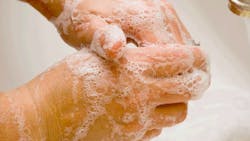A clean kitchen not only looks nice and inviting, it’s also healthier. Follow these kitchen health tips from David Shelburne, M.D., Family Medicine, Wake Forest Baptist Medical Center and the Centers for Disease Control and Prevention (CDC) to make sure your cooking is as safe and sanitary as it is delicious.
1. Lather, rinse, repeat. Wash your hands in warm water with soap at several points while preparing a meal, especially after working with raw items such as meat and eggs.
2. Kick cross-contamination to the curb. According to the Home Food Safety (HFS), part of the Academy of Nutrition and Dietetics, cross-contamination occurs when juices from raw meats or germs from unclean objects accidentally touch cooked or ready-to-eat foods, such as fruits or salads. Use two or more cutting boards to prevent cross contamination and the spread of harmful bacteria. You can further combat this risk by color-coding cutting boards and selecting specific, distinct utensils like ladles and flippers for meats and veggies.
3. Become a germ buster. To clean off a cutting board or any other item that has been used for meat, wash the board in hot water with soap. As an extra decontamination precaution, wipe the board down with a chlorine bleach solution and rinse with water.
4. Back away from that bottle. If you drink directly out of the carton or bottle and then return it to the fridge, you’re practically asking for a contaminated beverage. This practice introduces new bacteria that may grow as it sits. Always pour your beverage into your own glass or cup.
5. Avoid fridge overload. Jamming the fridge full of food may prevent the circulation of cold air that keeps food items cold and slows the growth of bacteria.
6. When reheating food, make it hot, hot, hot. Leftover food should be reheated to 165 degrees F in order to kill harmful bacteria.
7. Be smart when you defrost. Frozen items like meat should be defrosted in the refrigerator or in the microwave. When defrosting the item in the fridge, place it on a bottom shelf so juices don’t drip onto other foods. If the item has already been microwaved, make sure to cook it immediately.
Visit Wake Forest Baptist’s Health Topics page to learn more.
About the Author

Laura Walter
Laura Walter was formerly senior editor of EHS Today. She is a subject matter expert in EHS compliance and government issues and has covered a variety of topics relating to occupational safety and health. Her writing has earned awards from the American Society of Business Publication Editors (ASBPE), the Trade Association Business Publications International (TABPI) and APEX Awards for Publication Excellence. Her debut novel, Body of Stars (Dutton) was published in 2021.
